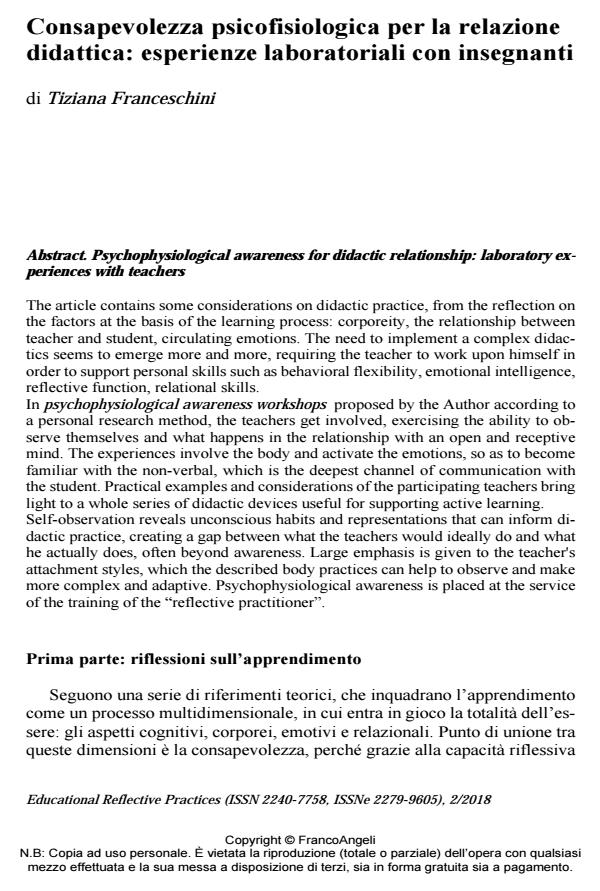Consapevolezza psicofisiologica per la relazione didattica: esperienze laboratoriali con insegnanti
Titolo Rivista EDUCATIONAL REFLECTIVE PRACTICES
Autori/Curatori Tiziana Franceschini
Anno di pubblicazione 2019 Fascicolo 2018/2
Lingua Italiano Numero pagine 31 P. 170-200 Dimensione file 254 KB
DOI 10.3280/ERP2018-002012
Il DOI è il codice a barre della proprietà intellettuale: per saperne di più
clicca qui
Qui sotto puoi vedere in anteprima la prima pagina di questo articolo.
Se questo articolo ti interessa, lo puoi acquistare (e scaricare in formato pdf) seguendo le facili indicazioni per acquistare il download credit. Acquista Download Credits per scaricare questo Articolo in formato PDF

FrancoAngeli è membro della Publishers International Linking Association, Inc (PILA)associazione indipendente e non profit per facilitare (attraverso i servizi tecnologici implementati da CrossRef.org) l’accesso degli studiosi ai contenuti digitali nelle pubblicazioni professionali e scientifiche
The article contains some considerations on didactic practice, from the reflection on the factors at the basis of the learning process: corporeity, the relationship be-tween teacher and student, circulating emotions. The need to implement a complex didac-tics seems to emerge more and more, requiring the teacher to work upon himself in order to support personal skills such as behavioral flexibility, emotional intelligence, reflective function, relational skills. In psychophysiological awareness workshops proposed by the Author according to a personal research method, the teachers get involved, exercising the ability to ob-serve themselves and what happens in the relationship with an open and receptive mind. The experiences involve the body and activate the emotions, so as to become familiar with the non-verbal, which is the deepest channel of communication with the student. Practical examples and considerations of the participating teachers bring light to a whole series of didactic devices useful for supporting active learning. Self-observation reveals unconscious habits and representations that can inform di-dactic practice, creating a gap between what the teachers would ideally do and what he actually does, often beyond awareness. Large emphasis is given to the teacher’s attachment styles, which the described body practices can help to observe and make more complex and adaptive. Psychophysiological awareness is placed at the service of the training of the "reflective practitioner".
Tiziana Franceschini, Consapevolezza psicofisiologica per la relazione didattica: esperienze laboratoriali con insegnanti in "EDUCATIONAL REFLECTIVE PRACTICES" 2/2018, pp 170-200, DOI: 10.3280/ERP2018-002012